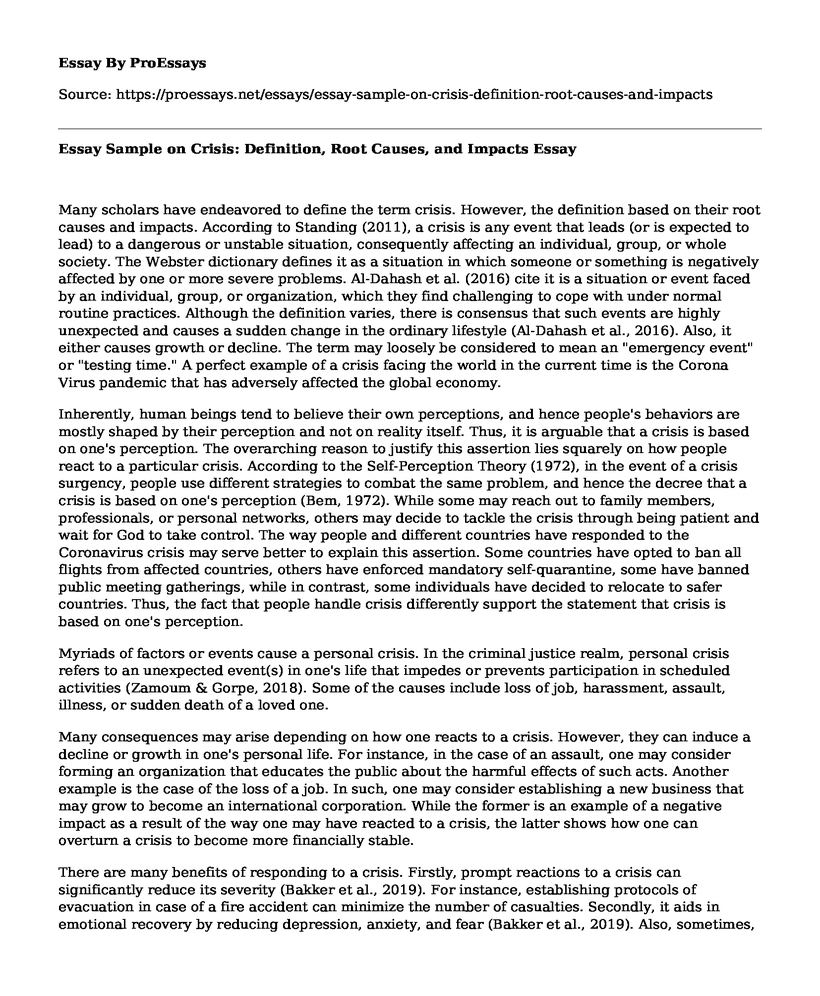Many scholars have endeavored to define the term crisis. However, the definition based on their root causes and impacts. According to Standing (2011), a crisis is any event that leads (or is expected to lead) to a dangerous or unstable situation, consequently affecting an individual, group, or whole society. The Webster dictionary defines it as a situation in which someone or something is negatively affected by one or more severe problems. Al-Dahash et al. (2016) cite it is a situation or event faced by an individual, group, or organization, which they find challenging to cope with under normal routine practices. Although the definition varies, there is consensus that such events are highly unexpected and causes a sudden change in the ordinary lifestyle (Al-Dahash et al., 2016). Also, it either causes growth or decline. The term may loosely be considered to mean an "emergency event" or "testing time." A perfect example of a crisis facing the world in the current time is the Corona Virus pandemic that has adversely affected the global economy.
Inherently, human beings tend to believe their own perceptions, and hence people's behaviors are mostly shaped by their perception and not on reality itself. Thus, it is arguable that a crisis is based on one's perception. The overarching reason to justify this assertion lies squarely on how people react to a particular crisis. According to the Self-Perception Theory (1972), in the event of a crisis surgency, people use different strategies to combat the same problem, and hence the decree that a crisis is based on one's perception (Bem, 1972). While some may reach out to family members, professionals, or personal networks, others may decide to tackle the crisis through being patient and wait for God to take control. The way people and different countries have responded to the Coronavirus crisis may serve better to explain this assertion. Some countries have opted to ban all flights from affected countries, others have enforced mandatory self-quarantine, some have banned public meeting gatherings, while in contrast, some individuals have decided to relocate to safer countries. Thus, the fact that people handle crisis differently support the statement that crisis is based on one's perception.
Myriads of factors or events cause a personal crisis. In the criminal justice realm, personal crisis refers to an unexpected event(s) in one's life that impedes or prevents participation in scheduled activities (Zamoum & Gorpe, 2018). Some of the causes include loss of job, harassment, assault, illness, or sudden death of a loved one.
Many consequences may arise depending on how one reacts to a crisis. However, they can induce a decline or growth in one's personal life. For instance, in the case of an assault, one may consider forming an organization that educates the public about the harmful effects of such acts. Another example is the case of the loss of a job. In such, one may consider establishing a new business that may grow to become an international corporation. While the former is an example of a negative impact as a result of the way one may have reacted to a crisis, the latter shows how one can overturn a crisis to become more financially stable.
There are many benefits of responding to a crisis. Firstly, prompt reactions to a crisis can significantly reduce its severity (Bakker et al., 2019). For instance, establishing protocols of evacuation in case of a fire accident can minimize the number of casualties. Secondly, it aids in emotional recovery by reducing depression, anxiety, and fear (Bakker et al., 2019). Also, sometimes, the response can provide an opportunity for personal growth.
Finally, one of the benefits of experiencing a crisis is that it offers an opportunity for society to learn and take measures to curb such risks in the future (Zoll & Neumann, 2017). For instance, the Corona Virus pandemic has taught wealthy people a good lesson, especially in developing countries. In such societies, when many of the upper-class citizens fall ill, they seek medication in overseas countries, where hospitals have better diagnosis equipment. However, within the current experiences of country lockdown, it has taught them the need to invest and develop their healthcare system.
References
Al-Dahash, H., Thayaparan, M., & Kulatunga, U. (2016). Understanding the terminologies: Disaster, crisis, and emergency. In Proceedings of the 32nd Annual ARCOM Conference, ARCOM 2016 (pp. 1191-1200). London South Bank University.
Bakker, M. H., Kerstholt, J. H., van Bommel, M., & Giebels, E. (2019). Decision-making during a crisis: the interplay of narratives and statistical information before and after crisis communication. Journal of risk research, 22(11), 1409-1424.
Bem, D. J. (1972). Self-perception theory. Advances in experimental social psychology, 6(1), 1-62.
Standing, G. (2011). Responding to the crisis: economic stabilization grants. Policy & Politics, 39(1), 9-25.
Zamoum, K., & Gorpe, T. S. (2018). Crisis Management: A Historical and Conceptual Approach for a Better Understanding of Today's Crises. In Crisis Management-Theory and Practice. IntechOpen.
Zoll, R., & Neumann, E. (2017). Workers' Reactions to Crisis. In Technological Change, Rationalisation and Industrial Relations (pp. 261-278). Routledge.
Cite this page
Essay Sample on Crisis: Definition, Root Causes, and Impacts. (2023, Apr 28). Retrieved from https://proessays.net/essays/essay-sample-on-crisis-definition-root-causes-and-impacts
If you are the original author of this essay and no longer wish to have it published on the ProEssays website, please click below to request its removal:
- A Management Decision-Making and Index Number Paper Example
- Emergency Physicians: Ethical Dilemmas & Decision-Making - Essay Sample
- Secure Your Business With a Professional Security System - Essay Sample
- Essay Example on Ethical Considerations: An Essential Part of Business Success
- Essay Example on Organizational Strategy: Path-Goal Relationship for Long-Term Success
- Paper Sample on Diversify Investment: Corporate Strategies for Risk Management
- Design Thinking: A Futuristic Approach to Innovation and Change Management - Free Paper







